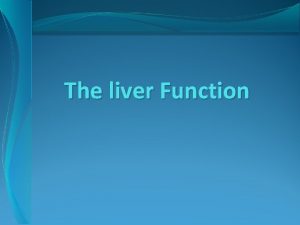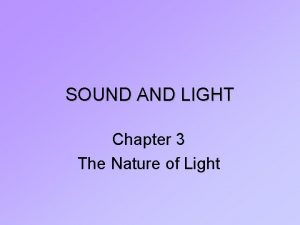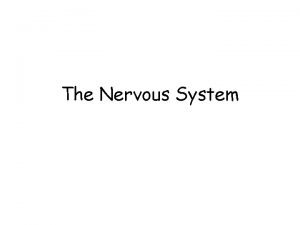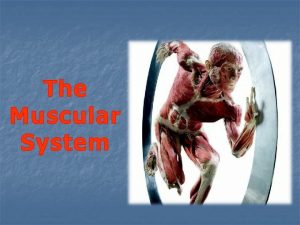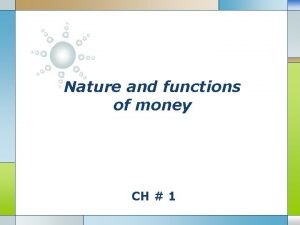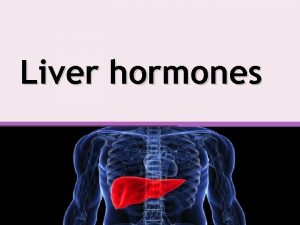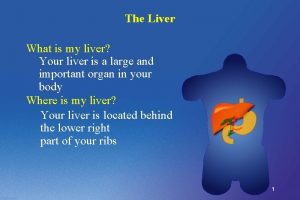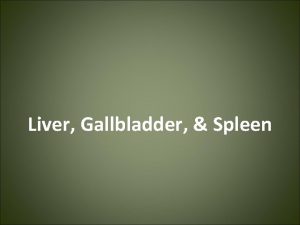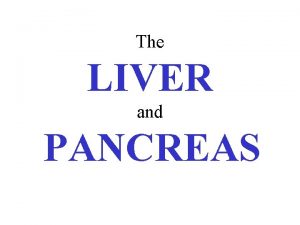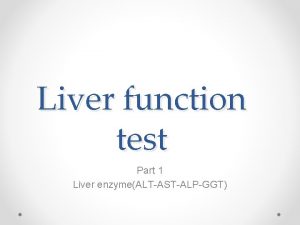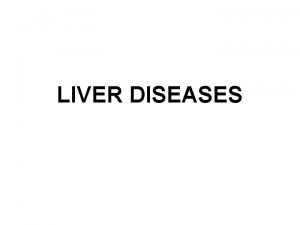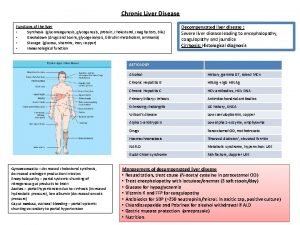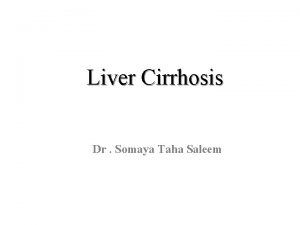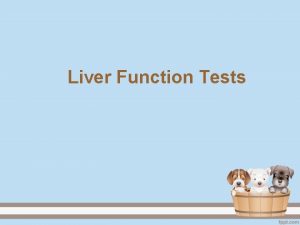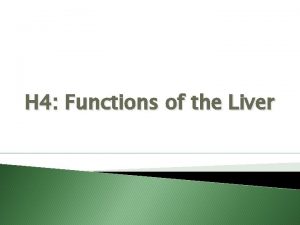LIVER The primary functions of the liver are
















- Slides: 16

LIVER

The primary functions of the liver are: • Bile production and excretion • Excretion of bilirubin, cholesterol, hormones, and drugs • Metabolism of fats, proteins, and carbohydrates • Enzyme activation • Storage of glycogen, vitamins, and minerals • Synthesis of plasma proteins, such as albumin, and clotting factors • Blood detoxification and purification

We shall look at only these 5 main points today due to time constraints: • Bile production and excretion • Excretion of bilirubin, cholesterol, hormones, and drugs • Synthesis of plasma proteins, such as albumin, and clotting factors • Storage of glycogen, vitamins, and minerals • Blood detoxification and purification

Bile production and excretion • The liver manufactures and secretes bile. This substance is stored in the gall bladder, pending for use in the small intestines. The bile emulsifies fats and thus they can be easily digested by the lipases. When needed, bile is drawn from the gall bladder at the duodenum.

FUN FACT • LIVER has regeneration/rejuvenation purposes, only 25% of the liver needs to be present for it to replace itself. basically, the cells in a liver generally act as stem cells, they are capable of making the liver 'complete' again. “Evolution”

Excretion of bilirubin, cholesterol, hormones, and drugs • We shall look at the excretion of bilirubin and forget about the rest for today… • Bilirubin is produced when old red blood cells is broken down in the spleen. The bilirubin travels in the bloodstream and finally gets to the liver. IN the liver bilirubin is further broken down into harmless substances. These substances may get passed out in the form of urine. • The Breakdown of hemoglobin: http: //highered. mcgrawhill. com/sites/0072495855/student_view 0/chapter 21/ani mation__hemoglobin_breakdown. html

Storage of glycogen, vitamins, and minerals • The liver converts excess glucose into glycogen which is stored in the liver. This is called liver glycogen. In a sense, the liver helps to maintain the blood glucose level together with the pancreas. • The pancreas secretes insulin, which travels through the bloodstream and reaches the liver. It converts excess glucose into glycogen so that the blood glucose level remains fairly constant throughout. You should now be able to see why people have diabetes, whether Type 1 or 2. • A small little trivia: Liver glycogen can be converted back to glucose unlike muscle glycogen, which cannot be converted back to glucose.

FUN FACT • herbs can be used to treat mucus and pus and other inflammatory substances present in the liver, but herbs must be used accordingly with a proper diet practised by the individual, this is to ensure that detoxification in the liver is being carried out optimally(at its optimum point). if liver or gall bladder is congested, victims will face emotional upsets, sluggishness and interestingly, sleeping and waking up the other day feeling weak.

Blood detoxification and purification • Example: Intake of alcohol • Alcohol is a poisonous substance in the human body. So, when alcohol enters the bloodstream, it will get sent to the liver so that it can be broken down into harmless substances. When the liver converts alcohol into harmless substances, some of the cells are actually destroyed or killed in the process. • Therefore, as you can see, if one takes in a substantial amount of alcohol over time, it will lead to cirrhosis, or the ‘scarring’ of the liver tissue. This ‘scar’ is actually fibrous tissue instead of liver cells.

Example 2: Absorption in the small and large intestines • As you can see, there are many ‘tributaries’ connected to the walls of the small intestines and the large intestines. The ‘tributaries’ merge as one to form the hepatic portal vein. This vein carries blood that contains all the nutrients and toxins that have been absorbed along the digestive tract from ingested food.

FUN FACT • If liver is 100% clean and free of impurities, we would be free of diseases and even the ageing process would slow down. liver cleanses 600 litres of blood daily, together with all matter, food or any substances found in it.

• The large intestines absorb water and mineral salts while the small intestines assimilate the nutrients into the bloodstream. These contain nutrients, mineral salts, and water as well as toxins (especially from the undigested food that moves along the large intestines). Thus, the liver is needed to detoxify and purify the blood.

Essential organ? • Of course. The liver is an exceptionally essential organ in the human body. Other than the kidneys, the liver filters and cleans the blood of its toxins. It also breaks down substances like bilirubin and produces bile, which is essential for the digestion of fats in the small intestines. • Without liver, our blood would be full of toxins and our blood glucose level would have gone hay-wire if not for the liver.

HUMANS WITHOUT LIVER • Without liver, humans will be frail from being prone to toxins that affect our body and unable to receive much emulsified fats due to the absence of bile • Faeces will be pale white in colour • Life span may be shortened Drastically • Everyone will get diabetes

THE END SO SEE HOW IMPORTANT IS THE LIVER? ? ?

DONE BY: THE LIVER TEAM Tan Ke Han (L) Zhao Heng Lee Wei De Clement Ling Hong Bang Wu THE LIVER TEAM
 Insidan region jh
Insidan region jh What is the primary function of the liver
What is the primary function of the liver Test for gilbert syndrome
Test for gilbert syndrome Magenta cyan and yellow are the ____ color. *
Magenta cyan and yellow are the ____ color. * Primary functions of the nervous system
Primary functions of the nervous system Which is a primary function of the muscular system
Which is a primary function of the muscular system Primary functions of insurance
Primary functions of insurance Secondary function of a product
Secondary function of a product Secondary functions of money
Secondary functions of money Absolute value as a piecewise function
Absolute value as a piecewise function Evaluating functions and operations on functions
Evaluating functions and operations on functions Evaluating functions and operations on functions
Evaluating functions and operations on functions Hình ảnh bộ gõ cơ thể búng tay
Hình ảnh bộ gõ cơ thể búng tay Slidetodoc
Slidetodoc Bổ thể
Bổ thể Tỉ lệ cơ thể trẻ em
Tỉ lệ cơ thể trẻ em Gấu đi như thế nào
Gấu đi như thế nào


